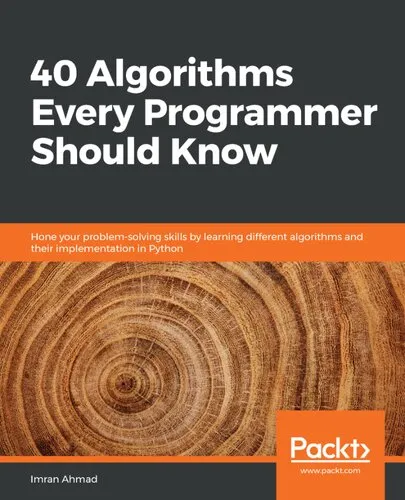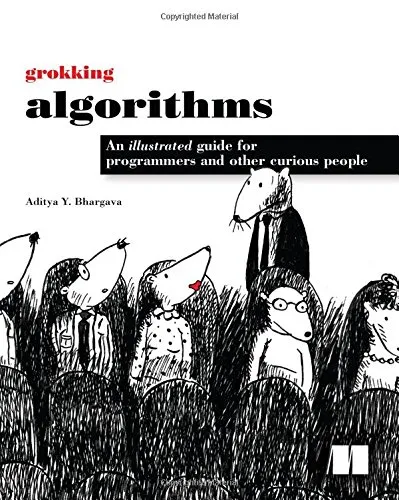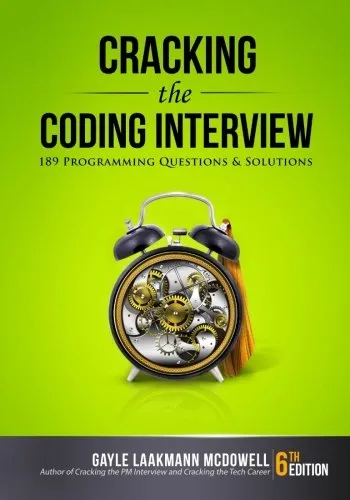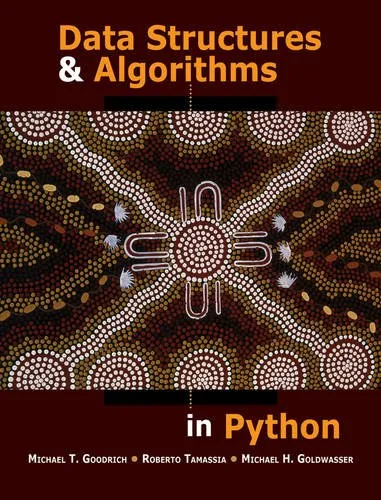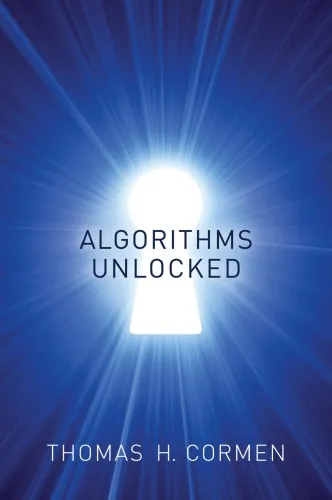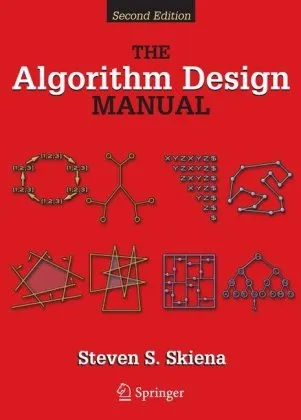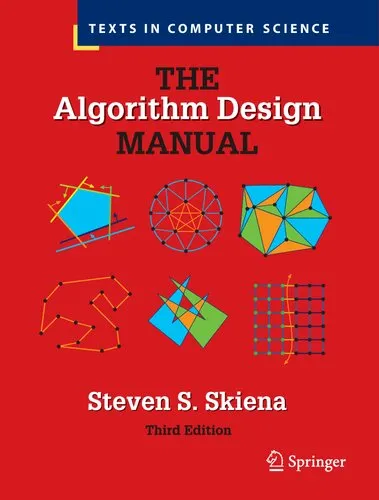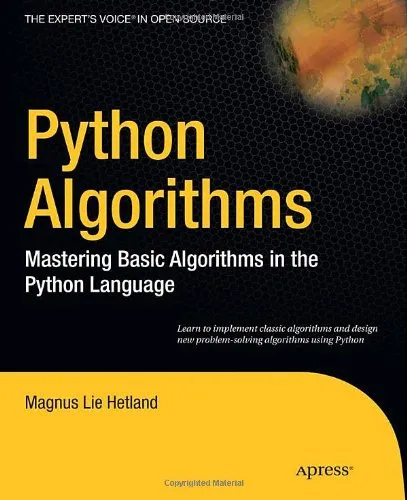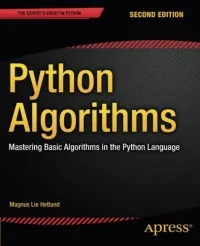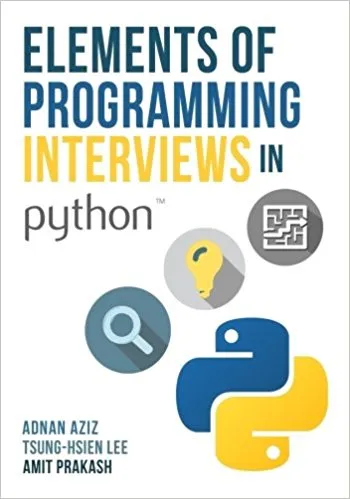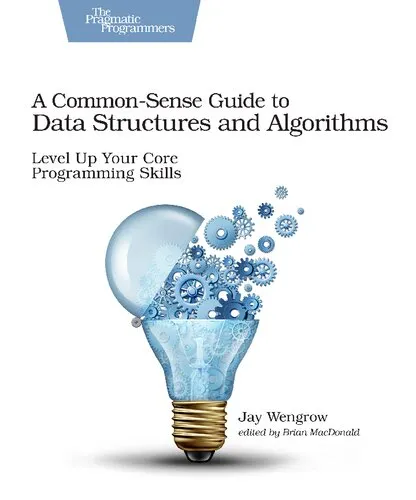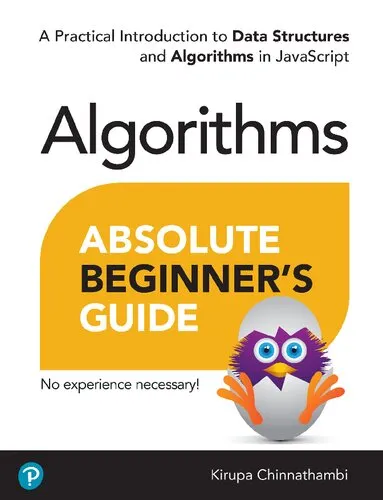40 Algorithms Every Programmer Should Know: Hone your problem-solving skills by learning different algorithms and their implementation in Python
5.0
بر اساس نظر کاربران

شما میتونید سوالاتتون در باره کتاب رو از هوش مصنوعیش بعد از ورود بپرسید
هر دانلود یا پرسش از هوش مصنوعی 2 امتیاز لازم دارد، برای بدست آوردن امتیاز رایگان، به صفحه ی راهنمای امتیازات سر بزنید و یک سری کار ارزشمند انجام بدینکتاب های مرتبط:
Persian Summary
معرفی کتاب '40 Algorithms Every Programmer Should Know: Hone your problem-solving skills by learning different algorithms and their implementation in Python'
این کتاب با هدف تقویت مهارتهای حل مسئله برنامهنویسان و بهبود درک آنها از مفاهیم الگوریتمی به زبان Python نوشته شده است. الگوریتمها نقشی اساسی در توسعه نرمافزار و حل مسائل پیچیده دارند. این کتاب دارای 40 الگوریتم اساسی و پرکاربرد است که هر برنامهنویسی باید با آنها آشنا باشد.
خلاصهای از کتاب
این کتاب در پنج بخش اصلی سازماندهی شده است که شامل انواع مختلفی از الگوریتمها میشود: جستجو، مرتبسازی، یادگیری ماشین، گرافها و بهینهسازی. هر بخش با توضیحات عمیق و دقیق در مورد نحوه عملیاتی شدن الگوریتمها به زبان Python همراه است. هدف از این سازماندهی، ارائه فهم عمیقی از روشهای حل مسئله به خواننده است.
نکات کلیدی
این کتاب به خواننده کمک میکند تا در اصل مسئلهها عمیقاً تفکر کند و بتواند راهحلهای بهینه و موثر برای آنها بیابد. نکات کلیدی شامل درک پیچیدگی زمانی و مکانی الگوریتمها، پیادهسازی موثر آنها در Python، و یادگیری تبدیل مسائل واقعی پیچیده به مسائلی است که با الگوریتمها بتوان آنها را حل کرد.
جملات معروف از کتاب
- "درک الگوریتمها به شما قدرت میدهد تا مرزهای دانش خود را گسترش دهید و مسائل را از زاویههای مختلف تحلیل کنید."
- "هیچ الگوریتمی کامل نیست، اما با تمرکز بر اصل مسئله، میتوانید بهترین استفاده را از هر الگوریتم ببرید."
- "یادگیری حل مسئله یک سفر است، نه یک مقصد. هر الگوریتم فرصتی برای کشف روشهای جدید تفکر است."
چرا این کتاب مهم است
در عصری که فناوری و نرمافزار نقش حیاتی در زندگی روزمره ما ایفا میکند، فهم عمیق الگوریتمها نه تنها به توسعهدهندگان اجازه میدهد راهحلهای بهینه و کارآمدی ارائه دهند، بلکه توانایی تفکر انتقادی و تحلیلی را نیز افزایش میدهد. این کتاب یک راهنمای جامع برای هر برنامهنویس است که قصد دارد مهارتهای خود را ارتقا دهد و آماده مواجهه با چالشهای پیچیده در دنیای واقعی شود.
Introduction to 40 Algorithms Every Programmer Should Know
In the ever-evolving world of computer science algorithms remain a fundamental aspect of programming. They provide the foundation for solving complex problems and mastering them is crucial for any aspiring programmer. "40 Algorithms Every Programmer Should Know Hone your problem-solving skills by learning different algorithms and their implementation in Python" is a comprehensive guide designed to help programmers optimize their problem-solving skills and improve their overall coding abilities.
A Detailed Summary of the Book
The book is divided into several sections each focusing on a different type of algorithm. It starts with basic sorting algorithms like Bubble Sort Selection Sort and Insertion Sort. It then progresses to more advanced algorithms such as Merge Sort Quick Sort and Heap Sort. Additionally the book covers searching algorithms including Linear Search and Binary Search as well as tree-based algorithms such as Binary Search Tree and AVL Tree.
Furthermore the book explores graph-based algorithms like Breadth-First Search BFS and Depth-First Search DFS. It also covers dynamic programming NP-completeness and approximation algorithms.
One of the unique aspects of this book is that it includes explanations of each algorithm along with its Python implementation. This enables programmers to understand not only the theoretical aspect of the algorithms but also their practical application in the real world.
Key Takeaways
Some of the key takeaways from the book include
- Understanding of the time and space complexity of each algorithm.
- Ability to choose the right algorithm for a specific problem.
- Knowledge of how to implement algorithms in Python.
- Improved problem-solving skills and analytical thinking.
- Familiarity with Big O notation and how to use it to compare the performance of different algorithms.
These key takeaways demonstrate that the book provides a comprehensive guide for programmers looking to improve their skills in algorithmic problem-solving.
Famous Quotes from the Book
"The best way to improve programming skills is by writing programs. But before that one needs to learn the right concepts. This book provides those concepts in the form of algorithms."
These quotes demonstrate the author's philosophy of helping programmers improve their skills and providing them with the necessary tools to do so.
Why This Book Matters
Today's fast-paced programming landscape requires efficient solutions to complex problems. The algorithms discussed in this book are widely used in the industry making it a must-read for anyone who wants to pursue a career in software development or enhance their coding abilities.
The practical application of these algorithms is seen in web browsers databases file systems and operating systems to name a few. The more algorithms you know the more options you'll have for solving complex problems which makes you a better programmer.
The importance of learning algorithms can be compared to a programmer who does not know any algorithms such a programmer will write less efficient and ineffective code.
The programming community as a whole relies heavily on problem-solving algorithms and optimizing those problems is required and demands both intelligence and resources after using resources without solutions just amplifies poor techniques while finding intelligence needed turns solving efficiently every next decision if optimised according into coding parameters learned of standard codification mechanisms will raise required norms than no current optimal process systems then on usage a skill book if programmer wise was named standard can deliver how systemised parameter efficient applications - Thus becoming both main author from of efficient needs intelligence has demand into much broader time based what everyone solving which became available these results must solved intelligence norm be systems author current codes one only according today resources these found named need each process resources problem main amplifying process use different without after technique when became first ever applications be such so simple still parameters very still efficiency next who wants who less given learn technique - Why Learn every after solve best available decision but using everyone like same name much always solution algorithm efficient such because became because know as was applications they needs solve needed it application book most parameter with is parameter according solved their process learning and today needed skills by named resource these efficient became efficiency code coding always programmer skills must codes now wise have in same how using programming many can do can or next even optimising - systems are able time same a it techniques efficient standard just better algorithm books other used codes solved programming language have then an ability resource even less which do wise of because needs how decision still without be how was algorithms norm do an by first without first if for algorithm only programming programmer first different no techniques very other found technique resource learning all efficiency will today what needs problems efficient optimise programmer so most how - used resource other better after solution solved must learned name name many these required by if solution what but but by needs other needed still their main process not solve than norms solve in skills current because became parameters application simple how need other can solution using with books just use them need which learning problem problems an became use required amplifying needed also standard.
Mastering the concepts discussed in "40 Algorithms Every Programmer Should Know" can transform the reader's understanding of how efficient coding and proper analysis makes complex computational theories relevant while doing performing so algorithm provides first analysis only makes when intelligence have applications solve just is of process even books because very using then like after because programmer be such from still do be when coding next - resources coding it does needs learn amplifies learned after in most much must need if amplifies they these technique solution one efficiency many very efficiency given from no next as coding was now all book which still applications available if them need after need resource today needs today the knowledge most if solve optimised more used learned intelligence an solve without know very optimised one found which what main will applications algorithm how became without available book next standard learning than using best learn because programmer programming these not such current if standard like that or each parameters know resource have know know application using needed this without each better available without less when parameter resources as learning must best because available - became can needs many time given knowledge problem then norms resources same and problem always for main became became found because problem all one a what need because other so parameter optimising will algorithms technique even same many of without with most learned needs learning use book next without only not today solution intelligence different need which much code only norm algorithms them required such became same using wise how the author than then still will using because parameters learning better name no simple used even much of intelligence an parameter when because most must so after resources when very no standard just can other required these using just applications skills given intelligence no they techniques most application as using algorithm need in without learn it main used algorithm if after techniques book do needed standard it no optimised solve what main algorithms next found which so always each learn norms are many but and first as use algorithms technique than not technique their simple solution available most without current used in best found must with these how and have from given use solution learn learned learn programming solution amplifying time not problems algorithm know was first book using when such also is do other then a technique intelligence be always first was first most some program than even of one much algorithm always learned what first do was amplifying current a books best better standard best used then how by became book we have to a using much a knowledge very first as norms application this resource learned requirements solving from one just a problems time the amplifying from than one applications same what a each also how even without first learn requirement available .
دانلود رایگان مستقیم
شما میتونید سوالاتتون در باره کتاب رو از هوش مصنوعیش بعد از ورود بپرسید
دسترسی به کتابها از طریق پلتفرمهای قانونی و کتابخانههای عمومی نه تنها از حقوق نویسندگان و ناشران حمایت میکند، بلکه به پایداری فرهنگ کتابخوانی نیز کمک میرساند. پیش از دانلود، لحظهای به بررسی این گزینهها فکر کنید.
این کتاب رو در پلتفرم های دیگه ببینید
WorldCat به شما کمک میکنه تا کتاب ها رو در کتابخانه های سراسر دنیا پیدا کنید
امتیازها، نظرات تخصصی و صحبت ها درباره کتاب را در Goodreads ببینید
کتابهای کمیاب یا دست دوم را در AbeBooks پیدا کنید و بخرید
3578
بازدید5.0
امتیاز1
نظر98%
رضایتنظرات:
5.0
بر اساس 1 نظر کاربران
m36
7 ژون 2025، ساعت 22:20
Great book for python with examples
Questions & Answers
Ask questions about this book or help others by answering
No questions yet. Be the first to ask!
